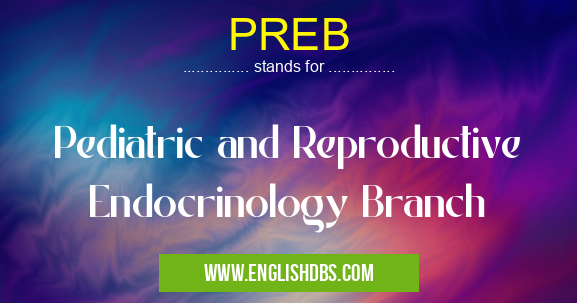What does PREB mean in PEDIATRIC
PREB stands for Pediatric and Reproductive Endocrinology Branch, which is a division within the Eunice Kennedy Shriver National Institute of Child Health and Human Development (NICHD) of the National Institutes of Health (NIH) in the United States.

PREB meaning in Pediatric in Medical
PREB mostly used in an acronym Pediatric in Category Medical that means Pediatric and Reproductive Endocrinology Branch
Shorthand: PREB,
Full Form: Pediatric and Reproductive Endocrinology Branch
For more information of "Pediatric and Reproductive Endocrinology Branch", see the section below.
Mission and Functions
- Conducts basic and clinical research on the endocrine system and reproductive biology in children and adolescents.
- Supports research on the development and function of the hypothalamic-pituitary-gonadal and adrenal axes.
- Investigates the causes and treatment of endocrine disorders, including growth disorders, puberty disorders, and reproductive health issues.
- Provides funding and support to researchers through grants and fellowships.
- Educates healthcare professionals and the public about pediatric and reproductive endocrinology.
Areas of Research
PREB's research focuses on a wide range of topics, including:
- Growth disorders: Short stature, tall stature, and hormonal imbalances affecting growth
- Puberty disorders: Early or delayed puberty, abnormal sexual development
- Reproductive health: Infertility, polycystic ovary syndrome, endometriosis
- Endocrine disorders: Diabetes, thyroid disorders, Cushing's syndrome, Addison's disease
Essential Questions and Answers on Pediatric and Reproductive Endocrinology Branch in "MEDICAL»PEDIATRIC"
What is the Pediatric and Reproductive Endocrinology Branch (PREB)?
The PREB is a branch of the Eunice Kennedy Shriver National Institute of Child Health and Human Development (NICHD), part of the National Institutes of Health (NIH). PREB conducts and supports research on the endocrine system and reproductive health of children and adolescents. Its focus includes disorders of growth, puberty, thyroid, adrenal glands, and reproductive development.
What are some common endocrine disorders studied by PREB?
Common endocrine disorders studied by PREB include growth hormone deficiency, precocious puberty, delayed puberty, thyroid disorders, and adrenal insufficiency. PREB researchers investigate the genetic, hormonal, and environmental factors contributing to these conditions and develop new diagnostic and treatment approaches.
How does PREB support research in pediatric and reproductive endocrinology?
PREB supports research through grants, fellowships, and collaborations. It provides funding for basic, translational, and clinical studies on endocrine and reproductive health issues. PREB also offers resources and training programs for researchers in the field.
What are the benefits of PREB's research?
PREB's research has led to advancements in the diagnosis and treatment of endocrine and reproductive disorders. Its findings have improved the health and quality of life for children and adolescents with these conditions. PREB's research also contributes to a better understanding of the normal development and function of the endocrine and reproductive systems.
How can I learn more about PREB and its research?
You can visit the PREB website at https://www.nichd.nih.gov/divisions/preb for more information about its mission, research programs, and funding opportunities. You can also contact PREB staff directly to inquire about specific areas of interest.
Final Words: PREB plays a crucial role in advancing the understanding and treatment of pediatric and reproductive endocrine disorders. Its research and educational efforts contribute to improved health outcomes for children and adolescents, supporting healthy growth, development, and reproductive function.
